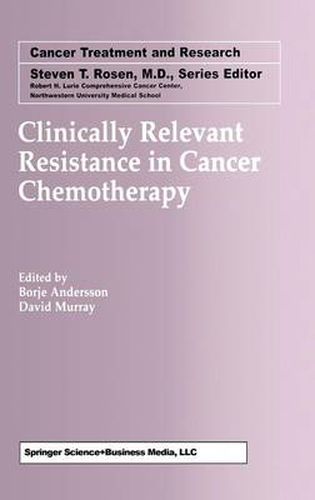Readings Newsletter
Become a Readings Member to make your shopping experience even easier.
Sign in or sign up for free!
You’re not far away from qualifying for FREE standard shipping within Australia
You’ve qualified for FREE standard shipping within Australia
The cart is loading…






This title is printed to order. This book may have been self-published. If so, we cannot guarantee the quality of the content. In the main most books will have gone through the editing process however some may not. We therefore suggest that you be aware of this before ordering this book. If in doubt check either the author or publisher’s details as we are unable to accept any returns unless they are faulty. Please contact us if you have any questions.
The introduction of new anticancer drugs and drug combinations, as well as the use of high-dose chemotherapy with growth factor and hemopoietic stem cell support, has greatly increased clinical remission rates. Unfortunately palliation, rather than cure, remains the most realistic goal of chemotherapy for many patients. The failure to cure metastatic cancer is commonly attributed to drug resistance . Resistance can be broadly viewed as the survival of malignant cells because of a failure to deliver an effective drug dose to the (cellular) target, resulting from any one of or combination of individual factors. For example, inter-individual genetic differences in drug metabolism, as well as differences in tumour kinetics and vascularization, may be important for treatment outcome. In addition, numerous molecular mechanisms of resistance have been elucidated at the level of the individual tumour cell. This volume reviews clinically relevant aspects of the pharmacokinetics of commonly used anticancer agents as well as mechanisms of cellular/experimental resistance to such agents. This extends to technological advances that enable high-throughput studies of genetic polymorphisms, which has opened up new avenues to the study of drug resistance and to the individualization of chemotherapy in order to decrease clinical toxicity and optimize treatment results.
$9.00 standard shipping within Australia
FREE standard shipping within Australia for orders over $100.00
Express & International shipping calculated at checkout
This title is printed to order. This book may have been self-published. If so, we cannot guarantee the quality of the content. In the main most books will have gone through the editing process however some may not. We therefore suggest that you be aware of this before ordering this book. If in doubt check either the author or publisher’s details as we are unable to accept any returns unless they are faulty. Please contact us if you have any questions.
The introduction of new anticancer drugs and drug combinations, as well as the use of high-dose chemotherapy with growth factor and hemopoietic stem cell support, has greatly increased clinical remission rates. Unfortunately palliation, rather than cure, remains the most realistic goal of chemotherapy for many patients. The failure to cure metastatic cancer is commonly attributed to drug resistance . Resistance can be broadly viewed as the survival of malignant cells because of a failure to deliver an effective drug dose to the (cellular) target, resulting from any one of or combination of individual factors. For example, inter-individual genetic differences in drug metabolism, as well as differences in tumour kinetics and vascularization, may be important for treatment outcome. In addition, numerous molecular mechanisms of resistance have been elucidated at the level of the individual tumour cell. This volume reviews clinically relevant aspects of the pharmacokinetics of commonly used anticancer agents as well as mechanisms of cellular/experimental resistance to such agents. This extends to technological advances that enable high-throughput studies of genetic polymorphisms, which has opened up new avenues to the study of drug resistance and to the individualization of chemotherapy in order to decrease clinical toxicity and optimize treatment results.